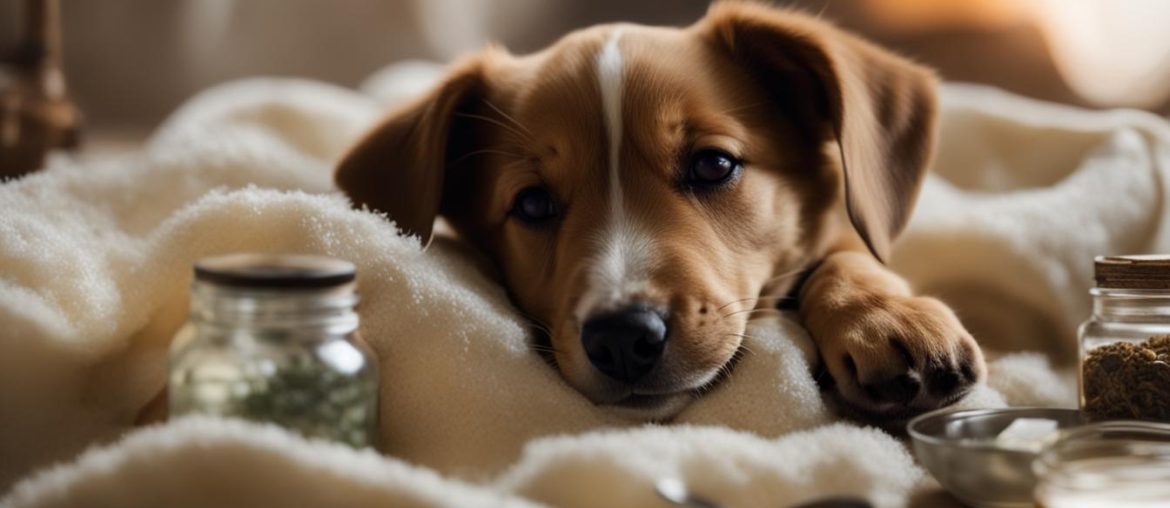If you have a puppy, you may have noticed them experiencing hiccups from time to time. Just like humans, dogs can also get hiccups, which are caused by involuntary contractions of the diaphragm. While hiccups are generally harmless and will usually go away on their own, they can be a bit uncomfortable for your furry friend. In this article, I will share some effective home remedies to help soothe your puppy’s hiccups and provide them with relief.
There are several factors that can contribute to puppy hiccups, including eating or drinking too quickly, consuming spicy food, stress, and stomach gas. It’s important to note that hiccups are more common in small puppies and tend to decrease in frequency as they age. However, if your puppy’s hiccups persist for more than a few hours or are accompanied by wheezing or difficulty breathing, it is advisable to consult a veterinarian to rule out any underlying health issues.
Key Takeaways:
- Home remedies can help soothe your puppy’s hiccups.
- Slowing down their eating and offering water can be effective.
- Consult a veterinarian if hiccups persist or if there are other concerning symptoms.
- Puppy hiccups are more common in small puppies and tend to decrease as they age.
- If your puppy’s hiccups are accompanied by wheezing or difficulty breathing, seek veterinary advice.
Can Dogs Get Hiccups?
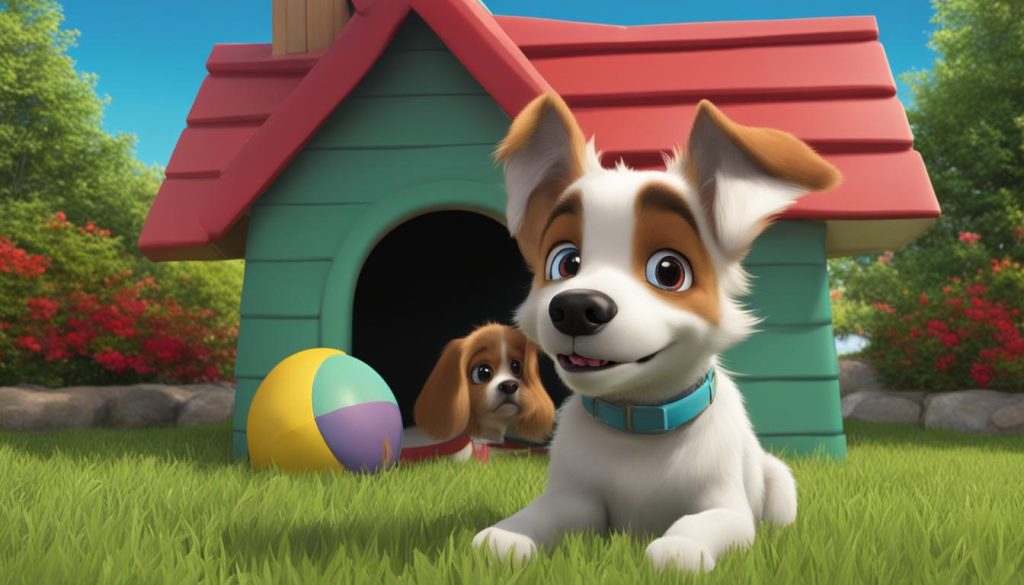
Dogs are not exempt from hiccups. Just like humans, dogs can experience those sudden, involuntary contractions of the diaphragm that we commonly refer to as hiccups. While hiccups in dogs are generally harmless and do not require immediate medical attention, it’s essential to keep an eye on their frequency and severity.
Hiccups in dogs, like puppies, tend to be more prevalent. As dogs age, however, the frequency of hiccups usually decreases. It’s interesting to note that hiccups in dogs serve no apparent purpose, but they are generally considered a normal part of their physiology.
Monitoring your dog’s hiccups is crucial to ensure there are no underlying health issues causing them. If you notice any significant changes or if the hiccups persist for an extended period, it’s advisable to consult with a veterinarian for a proper evaluation and peace of mind.
Can Puppies Get Hiccups?
Yes, puppies can get hiccups. In fact, hiccups are more common in small puppies than in adult dogs, and almost all puppies will experience hiccups at some point during their growth. It’s completely normal for puppies to have hiccups, and they may even have hiccups while still in their mother’s womb. While the exact cause of hiccups in puppies is unknown, it is believed to be related to the development of their breathing muscles.
Puppies have delicate and developing diaphragms, which can lead to more frequent hiccups compared to adult dogs. These hiccups can manifest as involuntary contractions of the diaphragm, resulting in the characteristic “hic” sound. While it may seem concerning, hiccups in puppies are usually harmless and resolve on their own.
To soothe your puppy’s hiccups, you can try gentle techniques that help calm their breathing and reduce any discomfort. Offering a calm and stress-free environment, stroking their back, or gently massaging their chest may help alleviate hiccups. It’s important to remember that puppies grow and develop at different rates, and their hiccups are usually a natural part of this process.
| Difference between puppy and adult dog hiccups | Puppy hiccups | Adult dog hiccups |
|---|---|---|
| Frequency | More common | Less common |
| Cause | Related to developing breathing muscles | Various factors like swallowing air, stress, or excitement |
| Duration | Shorter duration | Can last longer |
| Resolution | Typically resolve on their own | Usually resolve on their own |
Why Do Dogs and Puppies Get Hiccups?
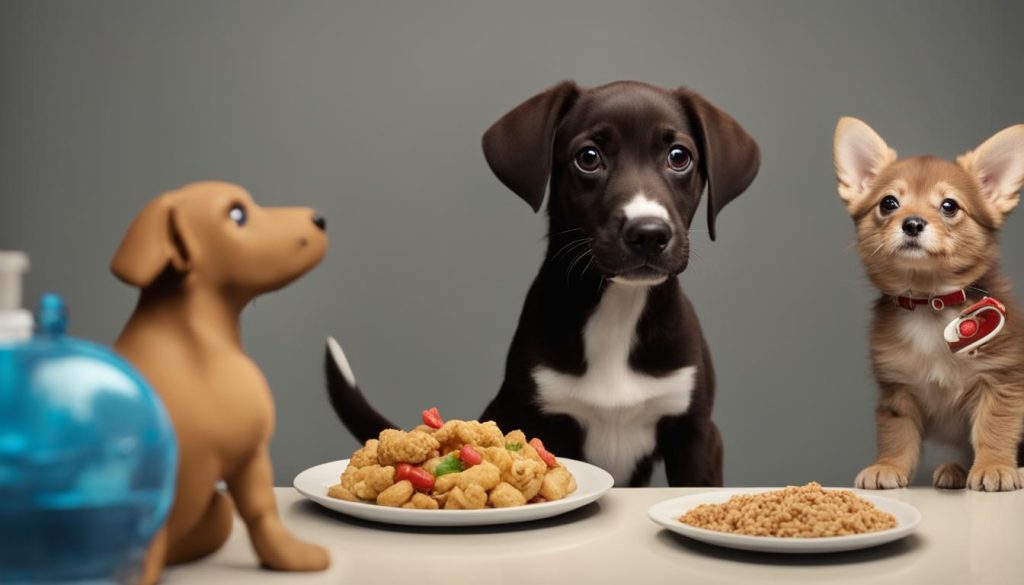
There are several reasons why dogs and puppies can get hiccups. Eating or drinking too quickly can cause hiccups by swallowing air, as can consuming spicy foods. Stress and overexcitement can also lead to hiccups in dogs, as well as stomach gas. Hiccups in dogs can serve as a way for the body to expel excess gas from the stomach.
To better understand why dogs and puppies get hiccups, let’s take a closer look at the possible causes:
- Swallowing air: Dogs, especially puppies, can gulp air while eating or drinking too quickly. This swallowed air can irritate the diaphragm, causing it to contract involuntarily and resulting in hiccups.
- Eating spicy foods: Just like humans, dogs can experience hiccups after consuming spicy foods. The ingestion of certain spices can stimulate the diaphragm and trigger hiccups in dogs.
- Stress and excitement: Dogs can get hiccups due to stress or overexcitement. These emotional states can lead to changes in breathing patterns, potentially causing the diaphragm to contract irregularly and resulting in hiccups.
- Stomach gas: Excess gas in the stomach can contribute to hiccups in dogs. Hiccups can serve as a natural way for the body to expel this gas and restore normal gastrointestinal function.
By understanding these common causes, dog owners can better address and manage hiccups in their furry friends. While hiccups in dogs are usually harmless and resolve on their own, there are methods that can help soothe a hiccuping dog. Stay tuned for the next section to learn more about how to get rid of dog hiccups.
How to Get Rid of Dog Hiccups
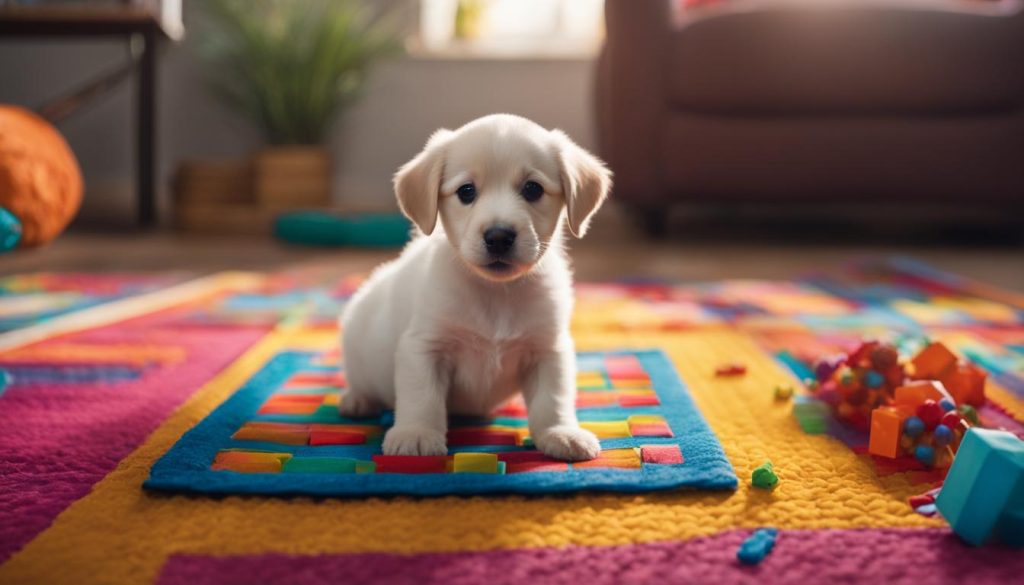
While hiccups in dogs are generally not a cause for concern and will typically resolve on their own, there are some methods that may help alleviate your dog’s hiccups. Here are a few strategies to try:
1. Slow down their eating
Feeding your dog smaller, more frequent meals can help prevent them from swallowing too much air, which can contribute to hiccups. Consider using a slow feeder bowl or puzzle toy to encourage slower eating.
2. Calm their irregular breathing
Gently rubbing your dog’s stomach or performing calming breathing exercises can help regulate their breathing and reduce hiccups. Take a few moments to soothe and relax your dog, helping them breathe more evenly.
3. Offer water slowly and calmly
Allowing your dog to drink water slowly and calmly can help alleviate hiccups. Avoid offering large amounts of water in one go, as this can increase the likelihood of hiccups.
Remember, it’s important not to startle or scare your dog in an attempt to stop their hiccups. This can add stress or discomfort and may not effectively alleviate the hiccups. Instead, opt for gentle methods to help your dog naturally ease their hiccups.
When Should I Take a Trip to the Vet?
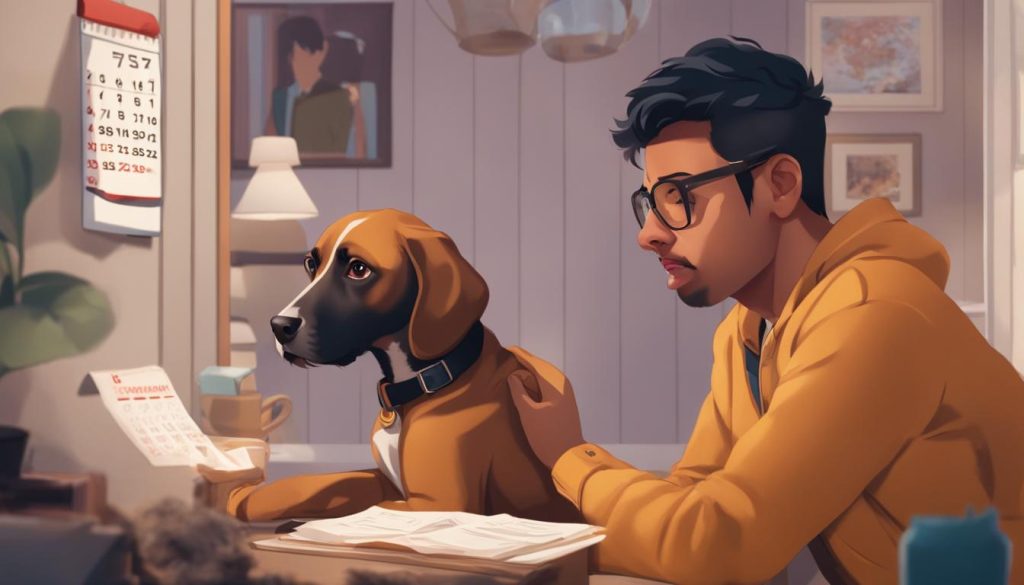
Hiccups in dogs are generally normal and not a cause for immediate concern. However, if your dog’s hiccups persist for more than a few hours, or if they are accompanied by wheezing or difficulty breathing, it may be a sign of an underlying health issue. In these cases, it is advisable to consult a veterinarian for a proper evaluation and treatment.
If you notice that your dog’s hiccups are lasting longer than usual or if they are experiencing any distress while hiccupping, it’s important to seek veterinary attention. Hiccups that last for more than a few hours can indicate an underlying problem that needs to be addressed. Additionally, if your dog is wheezing or having difficulty breathing along with hiccups, it could be a sign of a respiratory issue that may require immediate medical attention.
A veterinarian will be able to examine your dog, evaluate their overall health, and determine the underlying cause of the hiccups. They may conduct tests or imaging to rule out any serious conditions. Depending on their findings, the vet may recommend treatment options to alleviate the hiccups and address any underlying health issues.
Remember, as a responsible pet owner, it’s essential to be proactive when it comes to your dog’s health. While hiccups are generally harmless, it’s crucial to monitor your dog’s symptoms and seek veterinary advice when necessary. By taking prompt action and consulting a professional, you can ensure the well-being and happiness of your furry friend.
What Exactly Are Dog Hiccups, Anyway?

Dog hiccups are involuntary spasms of the diaphragm, the muscle responsible for breathing. These spasms cause the vocal cords to briefly close, resulting in the characteristic “hic” sound. While the exact purpose of hiccups in dogs is not fully understood, it is believed to be related to the development of the breathing muscles during fetal stages.
Dog hiccups can occur in dogs of all ages, but they are more common in puppies. Just like humans, dogs experience these spasms as a normal physiological response. Dog hiccups usually resolve on their own within a short period of time and don’t typically require medical intervention. However, persistent hiccups or those accompanied by other symptoms should be evaluated by a veterinarian.
What Causes Dog Hiccups?
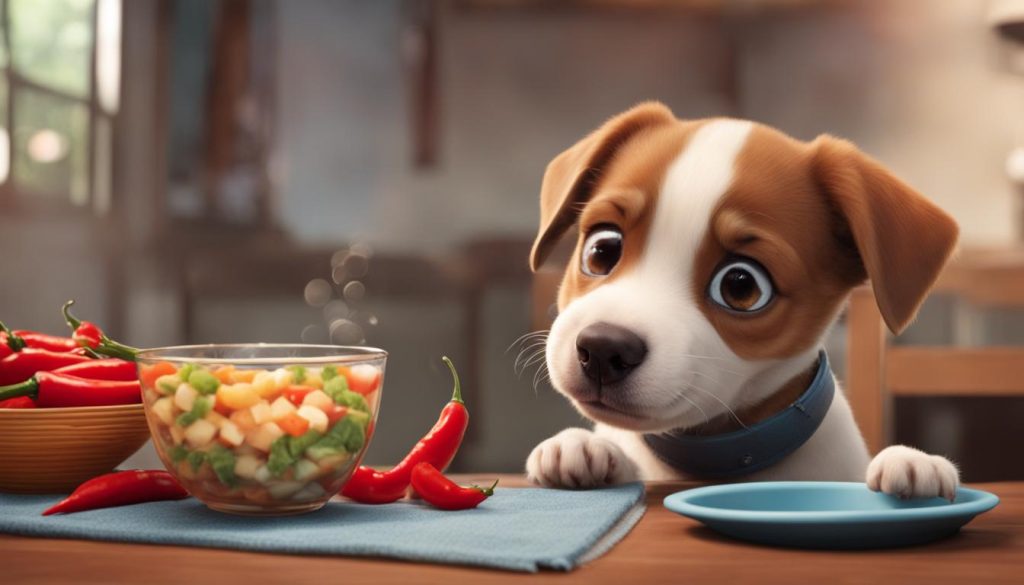
The exact cause of dog hiccups is not fully known, but several factors can contribute to their occurrence. Dogs may experience hiccups when they swallow too much air while eating or drinking too quickly. Emotional stress, excitement, and heavy breathing or panting can also trigger hiccups in dogs. Additionally, certain foods, such as spicy ones, may stimulate neuron activity in the diaphragm and lead to hiccups.
If you want to learn more about the causes and remedies for dog hiccups, check out the table below for a comprehensive summary.
| Cause | Description |
|---|---|
| Swallowing air | When dogs eat or drink too quickly, they may unintentionally swallow air, leading to hiccups. |
| Emotional stress | Dogs experiencing stress or anxiety may have more frequent hiccups. |
| Excitement | Excessive excitement can trigger hiccups in dogs, especially during playtime or interactions with other animals. |
| Panting or heavy breathing | Rapid or intense breathing can disrupt the normal functioning of the diaphragm, resulting in hiccups. |
| Spicy foods | Certain spices or ingredients in food may stimulate the diaphragm and cause hiccups in dogs. |
How to Make Dog Hiccups Stop
While there is no foolproof method to stop dog hiccups, there are some techniques that may help alleviate them.
| Technique | Description |
|---|---|
| Offer Water | Provide your dog with some water to drink. This can help to soothe their throat and potentially stop the hiccups. |
| Provide Something Sweet and Sticky | Offer a small amount of something sweet and sticky, such as honey or peanut butter. This can help to coat the throat and potentially alleviate the hiccups. |
| Gently Massage the Chest | Massage your dog’s chest gently to relax the diaphragm. This can help to stop the contractions that cause the hiccups. |
It’s important to approach these remedies calmly and gently, as scaring or startling your dog can do more harm than good.
How Long Do Dogs Hiccups Last?
Dog hiccups typically last for about 30-60 seconds, although the duration can vary. Most hiccups in dogs will resolve on their own within a short period of time. If hiccups persist for more than an hour or occur frequently over several days, it may be an indication of an underlying health issue that should be evaluated by a veterinarian.
| Dog Hiccups Duration | Frequency of Occurrence | When to Consult a Vet |
|---|---|---|
| Usually 30-60 seconds | Resolve on their own | If lasting over an hour or occur frequently over several days |
How to Prevent Hiccups in Dogs
While it is not possible to completely prevent hiccups in dogs, there are some measures you can take to reduce the likelihood of their occurrence. By implementing the following strategies, you can help keep your furry friend hiccup-free:
- Slow Down Your Dog’s Eating: Use slow feeders or divide their meals into smaller portions to discourage fast eating, which can contribute to hiccups.
- Provide a Calm and Stress-Free Environment: Minimize loud noises, sudden movements, and other stressors that can trigger hiccups in dogs.
- Avoid Spicy or Irritant Foods: Certain foods, such as spicy ingredients or irritants, may stimulate the diaphragm and lead to hiccups. Stick to a balanced diet that is suitable for your dog’s needs.
- Regular Exercise: Keeping your dog active can help regulate their digestive system and reduce the chances of hiccups.
| Preventive Measures | Advantages |
|---|---|
| Slowing down eating | Reduces the chances of swallowing air and developing hiccups |
| Providing a calm environment | Minimizes stress and potential triggers for hiccups |
| Avoiding spicy or irritant foods | Helps prevent stimulation of the diaphragm and hiccups |
| Regular exercise | Aids in digestion and promotes overall health, lowering the risks of hiccups |
Wrapping Up
Hiccups in dogs, including puppies, are a common occurrence and usually nothing to be concerned about. In most cases, they will resolve on their own without any intervention. However, if your dog’s hiccups persist for more than a few hours or are accompanied by wheezing or difficulty breathing, it is important to consult a veterinarian for further evaluation.
While there are some simple methods that may help alleviate hiccups in dogs, such as slowing down their eating and offering them water, it’s essential to prioritize your pet’s well-being and seek professional advice if needed. Veterinarians have the expertise to determine whether there is an underlying health issue contributing to the hiccups and can provide appropriate treatment if necessary.
By understanding the causes and potential remedies for dog hiccups, you can provide comfort and relief for your furry companion. Remember to create a calm and stress-free environment for your dog, monitor their eating habits, and avoid giving them spicy or irritant foods. Regular exercise and maintaining a balanced diet are also key factors in preventing hiccups in dogs.
Overall, while hiccups in dogs may be a temporary inconvenience, with proper care and attention, you can help your dog navigate through these occasional bouts smoothly, ensuring their health and happiness in the long run.
FAQ
Can dogs get hiccups?
Yes, dogs can get hiccups. In fact, hiccups are more common in puppies than in adult dogs, and nearly all puppies will experience hiccups at some point during their growth.
Can puppies get hiccups?
Yes, puppies can get hiccups. Hiccups are more common in small puppies and usually decrease in frequency as they age. Puppies can even have hiccups while still in their mother’s womb.
Why do dogs and puppies get hiccups?
The exact cause of hiccups in dogs and puppies is unknown, but they are believed to be related to the development of breathing muscles. Eating or drinking too quickly, consuming spicy food, stress, and stomach gas can all contribute to puppy hiccups.
How to get rid of dog hiccups?
While hiccups in dogs generally resolve themselves, there are some methods that may help soothe your dog’s hiccups. These include slowing down their eating, calming their breathing, and offering water to drink slowly and calmly.
When should I take a trip to the vet?
Hiccups in dogs are typically not a cause for concern. However, if hiccups persist for more than a few hours or are accompanied by wheezing or difficulty breathing, it’s best to consult a veterinarian for a proper evaluation and treatment.
What exactly are dog hiccups, anyway?
Dog hiccups are involuntary spasms of the diaphragm, the muscle responsible for breathing. These spasms cause the vocal cords to briefly close, resulting in the characteristic “hic” sound.
What causes dog hiccups?
While the exact cause of dog hiccups is not fully known, factors such as swallowing air when eating or drinking too quickly, emotional stress, excitement, and panting or heavy breathing can contribute to their occurrence. Certain foods, such as spicy ones, may also stimulate neuron activity in the diaphragm and lead to hiccups in dogs.
How to make dog hiccups stop?
There is no foolproof method to stop dog hiccups, but there are some techniques that may help alleviate them. These include offering your dog water to drink, providing a small amount of something sweet and sticky like honey or peanut butter to soothe their throat, and gently massaging their chest to relax the diaphragm.
How long do dog hiccups last?
Dog hiccups typically last for about 30-60 seconds, although the duration can vary. Most hiccups in dogs will resolve on their own within a short period of time. If hiccups persist for more than an hour or occur frequently over several days, it may be an indication of an underlying health issue.
How to prevent hiccups in dogs?
While it is not possible to completely prevent hiccups in dogs, there are some measures you can take to reduce the likelihood of their occurrence. These include slowing down your dog’s eating, providing a calm and stress-free environment, and avoiding giving your dog spicy or irritant foods. Regular exercise and maintaining a balanced diet may also help prevent hiccups in dogs.
Wrapping Up
Hiccups in dogs, including puppies, are usually not a cause for concern and will typically resolve on their own. While there are some methods that may help alleviate hiccups in dogs, it’s important to consult a veterinarian if hiccups persist for more than a few hours or are accompanied by wheezing or difficulty breathing. By understanding the causes and potential remedies for dog hiccups, you can provide comfort and relief for your furry companion.


